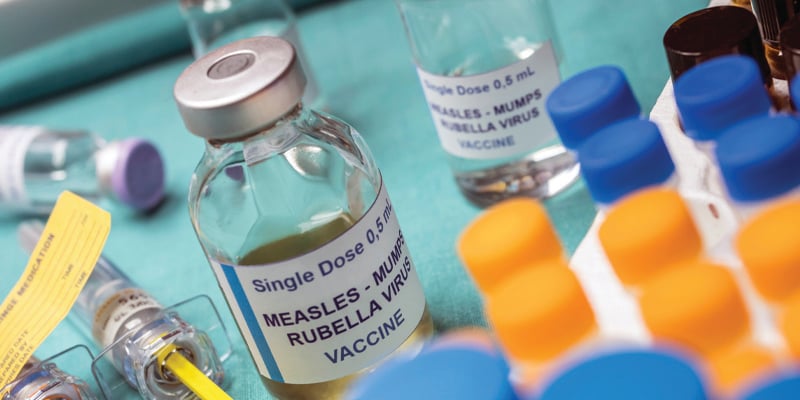It’s been 25 years since measles were eliminated from the US. But now, the country has seen more than 600 measles cases so far this year. That number is more than double the total reported cases in all of 2024 (285). According to the CDC, of these 600+ cases, 93% are associated with six outbreaks spanning several states. As of April 8th, Colorado reported at least three cases of measles: in Denver, Pueblo, and Archuleta County.
Scott Harpin, PhD, MPH, RN, a Professor and Maternal-Child Health Division Chair at the University of Colorado College of Nursing at Anschutz Medical Campus and a public health expert, explains what people should know about the measles to stay informed, safe, and healthy.
What is measles?
Measles is a highly contagious, airborne illness caused by a virus. It can cause serious complications, but it is preventable with the MMR (measles, mumps, and rubella) vaccine. The CDC says if one person has measles, about nine out of ten people in close contact will become infected if they’re not protected. And the virus can linger 2+ hours in a room, which compounds its infectiousness.
Measles is different but similar to German measles, also known as rubella. Rubella is also an airborne virus, but symptoms are typically less severe than measles.
Symptoms are similar to other respiratory illnesses
Symptoms typically appear seven to 14 days after contact with the virus, sometimes even in the third week after the initial infection. People infected with measles start having a fever, cough, and a runny nose, followed by a telltale rash on their face and head a few days later.
“A lot of these symptoms are similar to other illnesses that have been floating around over the past few months,” Harpin says. “But the main symptom is a rash – it typically develops on someone’s head and then travels down to other parts of the body.”
If you’re vaccinated, you’re most likely protected
The MMR vaccine is given to infants after their first birthday, so any parent with a child younger than one should be more concerned about catching measles. The second dose of the MMR vaccine is given to children when they’re five or six years old, giving people additional protection.
“Your chances of getting the measles dramatically decrease after getting one dose,” Harpin says. “If you have two doses of the most current manufactured vaccine – which was developed in the early 70s- you don’t have a lot to worry about in terms of catching the measles. For one segment of the population – people who were born in the late 50s, early 60s – that vaccine was a different type, so you’ll want to check with your physician or healthcare provider to check if you have antibodies.”
Harpin says even if someone has the MMR vaccine, there is still a chance they could get the measles.
“It’s similar to what happens with the COVID-19 or flu vaccine. People who get the vaccine may still get sick, but how sick they get is likely not quite as severe as if they had no vaccine at all,” he says.
Should people consider getting re-vaccinated?
Harpin says it doesn’t hurt to get another vaccine if one is indicated or suggested by their healthcare provider, but people should check rather than assume they need one. He says for certain population groups, a healthcare provider might suggest a titer or a blood test that measures antibodies to determine immunity.
“If you have a record of getting two doses, in general, people don’t need a third dose,” Harpin says. “But if you don’t know your vaccine record – or only got one vaccine – it doesn’t hurt to get an additional vaccine.”
A new case may not lead to an outbreak. Public health works hard to contain the initial cases so they don't grow.
The largest outbreak in the U.S. is in West Texas, consisting of at least 500 cases. As of this writing, there is no outbreak associated with any of Colorado’s cases.
"It remains to be seen if an outbreak can happen as a result of Colorado’s cases. An outbreak is defined as such when you have 3 or more interconnected cases. An outbreak could just as easily start if an unvaccinated individual did international travel, brought it back to Colorado, and the virus is introduced to others susceptible to getting measles,” Harpin says.
In the new case announced by CDPHE on April 8th, a baby under 1 year of age recently traveled to an area of Mexico experiencing an outbreak, then became symptomatic and was seen at Denver Health's ER.
"If that baby lives in a household with others who have no evidence of immunity, it can quickly lead to Colorado's first measles outbreak this year,” Harpin says.
Isolate if you’ve been exposed or think you’ve been exposed.
The Colorado Department of Public Health and Environment (CDPHE) says people who may have come into contact with someone who has measles should monitor for symptoms for up to 21 days after potential exposure and avoid large gatherings.
“You don’t want to jump in the car and go to your clinic, hospital, or the ER,” Harpin says. “If you think you’ve been exposed or if you’re starting to show symptoms, stay home and call your healthcare provider to get advice on what you should do next.”
Public health officials are focusing on educating the unvaccinated population.
Harpin says that all the news lately about vaccines – both good and bad – has caused people to become hesitant about getting protected.
“In public health, we’re trying to motivate people to think about their vaccination status,” Harpin says. “You often can’t change someone’s opinion on whether or not vaccines are good or bad, but you can educate them and give them information. We do our best as healthcare providers and public health educators to get the word out about how people can prevent things like the measles and other diseases.”




